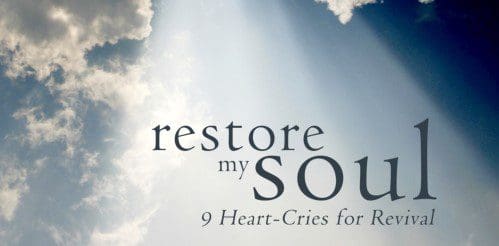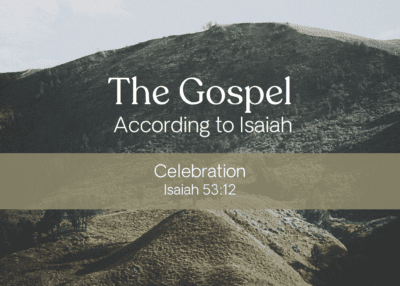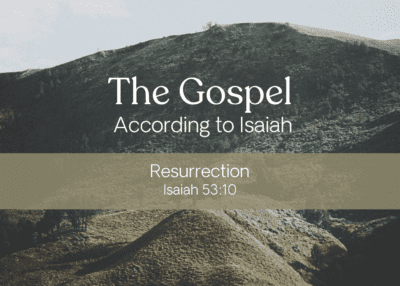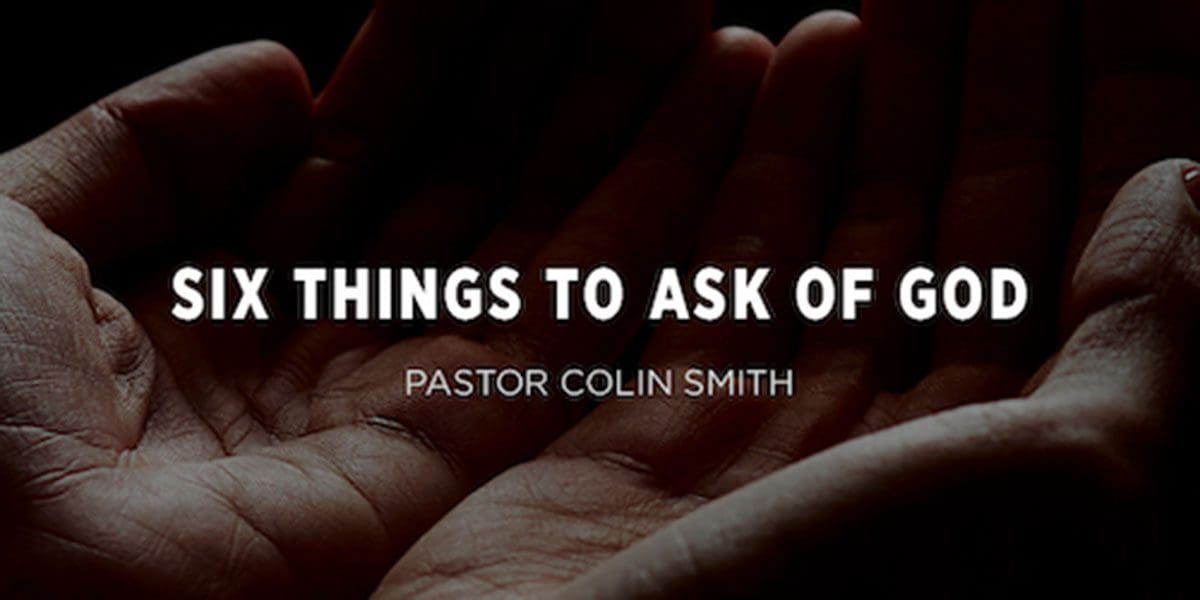The Lord has anointed me… to proclaim the year of the Lord’s favor and the day of vengeance of our God. Isaiah 61:1-2 (NIV)
Our whole lives are lived in between times. We look back to the birth, death and resurrection of Jesus Christ. And we look forward to His second coming.
That means our Christian hope comes from one source, but two directions. Our hope is in Jesus Christ. That hope began through his birth, death and resurrection, and it will be fulfilled through His coming again in power and glory. “If only for this life we have hope in Christ, we are to be pitied more than all men” (1 Corinthians 15:19).
This is a great theme for the end of the year. My prayer is that God will renew our hope in Christ as we prepare to launch into another year.
Hope in Him Because He is the Compassionate Savior
“The Spirit of the Sovereign Lord is on me, because the Lord has anointed me to preach good news to the poor. He has sent me to bind up the brokenhearted, to proclaim freedom for the captives and release from darkness for the prisoners, to proclaim the year of the Lord’s favor…” Isaiah 61:1-2 NIV
Back in the time of Moses, God had given some marvelous laws for the protection of the poor. Let me tell you about three of them.
All debts were to be cancelled
“At the end of every seven years you must cancel debts. This is how it is to be done: Every creditor shall cancel the loan he has made to his fellow Israelite. He shall not require payment from his fellow Israelite or brother, because the LORD’s time for canceling debts has been proclaimed.” (Deuteronomy 15:1).
Imagine if that was the law in this country: “Visa and MasterCard will cancel all debts every seven years!”
All slaves were to be released
“If one of your countrymen becomes poor among you and sells himself to you, do not make him work as a slave. He is to be treated as a hired worker or a temporary resident among you; he is to work for you until the Year of Jubilee” (Leviticus 25:39-40).
When folks were unable to pay their debts, they could fulfill their responsibility by offering their labor. But God said that this could not go beyond seven years. However you redistribute wealth there will always be some who make better use of it than others, and so God saw that there would always be a need to relieve the poor.
If you get into conversation with someone who wants to blame Christianity for every evil in the world, and they tell you that Christianity is responsible for slavery, ask them what they think of God’s anti-slavery laws in the Old Testament. These were marvelous laws for the protection of the poor.
All land was to be returned
“Count off seven sabbaths of years–seven times seven years–so that the seven sabbaths of years amount to a period of forty-nine years. Then have the trumpet sounded everywhere on the tenth day of the seventh month; on the Day of Atonement sound the trumpet throughout your land.
Consecrate the fiftieth year and proclaim liberty throughout the land to all its inhabitants. It shall be a jubilee for you; each one of you is to return to his family property and each to his own clan” (Leviticus 25:8-10).
When God’s people went into the promise land, God gave a portion of the land to each tribe and to each family. The Jubilee law was given to make sure that it stayed that way. Over the years some people would find it necessary to sell their land, but once in every lifetime, on the 50th year, the land was to be returned to the original owners.
In other words, land was held on a leasehold basis. That meant that the price or value of the land was determined by where you were in the 50-years cycle. The nearer the Jubilee you got, the lower the price of the land, because it would soon return to its original owner. If you bought the year after the Jubilee, the price of the land would be higher because you would have it for 49 years before it would be returned:
“You are to buy from your countryman on the basis of the number of years since the jubilee…” (v15).
“When the years are many you are to increase the price, and when the years are few you are to decrease the price, because what he is really selling you is the number of crops” (v16).
“Do not take advantage of each other, but fear your God. I am the Lord your God” (v17).
Where God’s laws utterly fail
These are marvelously compassionate laws. They placed a check on the growing power of those who had accumulated wealth. They made sure that the children of the wealthy would have to find their own way rather than floating through life on massive inheritances.
They gave a new start to the poor and the oppressed that happened once in every lifetime. No other country ever had laws like these. No culture has ever protected the poor like this. God says “You are my people, and this is what you are to do.”
How would you have liked to live under these laws? A lot would depend on whether you were a borrower or a lender. These laws were great for debtors. But they were costly for creditors.
God gave these laws to Moses when the people were in the wilderness. He said “When I bring you into the Promised Land, this is what you are to do: Every 50 years you are to sound the trumpet and proclaim the year of the Lord’s favor.”
How often do you think this happened? Never! Not even once! Howard and Rosenthal say about the Jubilee:
“There is no historical record, biblical or extra-biblical, that Israel ever once observed the Jubilee year.” [1]
It’s not difficult to work out why: The folks with the power were also the folks with the money. When they looked at what the Jubilee would cost them they decided against it! So the trumpet never sounded.
By the time of Isaiah, God’s people had been in the land 700 years. There should have been 14 Jubilees by then, but there hadn’t been a single one. The year of the Lord’s favor was never proclaimed!
That’s why the Old Testament prophets are so scathing about the oppression of the poor. God’s laws for the protection of the poor were systematically ignored!
It’s not surprising. These laws could only operate among people who loved God with all their heart, soul, mind and strength and who loved their neighbor as themselves.
There has never been a country or culture where that was true!! God’s perfect law shows us our sin. It shows us how selfish we really are. It proves how much we need to be redeemed.
God speaks to Isaiah about how someone will come to preach good news to the poor, to bind up the broken hearted… to proclaim the Jubilee—the year of the Lord’s favor. Who will do this? Who will have the power and be willing to pay the price?
Where God’s laws fully prosper
“The scroll of the prophet Isaiah was handed to [Jesus]. Unrolling it, he found the place where it is written, ’The Spirit of the Lord is on me, because he has anointed me to preach good news to the poor. He has sent me to proclaim freedom for the prisoners and recovery of sight for the blind, to release the oppressed, to proclaim the year of the Lord’s favor.’
Then Jesus rolled up the scroll, gave it back to the attendant, and sat down. The eyes of everyone in the synagogue were fastened on him, and he began by saying to them, ‘Today this Scripture is fulfilled in your hearing.’” (Luke 4:18-21)
Christ says, “They haven’t proclaimed the Jubilee. They never will. I will do it. I have come to proclaim the year of God’s favor!” God is going to do for you what you would not do for each other. He will forgive your sin. He will cancel all your debts to Him. He will set you free from Satan’s power. God will give you back the inheritance that Adam lost, so that you will enjoy life in His presence forever.
That’s the promise of the gospel, and it is the most marvelous good news. But the year of God’s favor that brings hope and joy to us came at an incredible cost to Him. If you write off a debt, you lose the amount of that debt yourself. When God writes off all our debts to Him, that means He incurs that total debt in Himself.
That is why Christ went to the cross. He bore the loss to cancel our debts and restore our inheritance—God canceling all debts, God restoring lost inheritances—in Christ. That’s our hope. That’s the Gospel.
When will God’s law fully prosper?
“The Lord has anointed me to… proclaim the year of the Lord’s favor and the day of vengeance of our God” (Isaiah 61:1-2).
When our Lord read from the scroll, he stopped right in the middle of that sentence: “To proclaim the year of the Lord’s favor,” and He finished it by saying “Today this Scripture is fulfilled in your hearing.”
Thank God Jesus stopped in the middle of Isaiah’s sentence! If he hadn’t stopped there, we wouldn’t be here today. If Jesus had brought the day of God’s vengeance, the world as we know it would have ended 2,000 years ago.
He said “I have come to bring the year of God’s favor.” Period. What about the day of God’s vengeance? That day is still to come. Jesus says “A time is coming when all who are in their graves will hear his voice and come out–those who have done good will rise to live, and those who have done evil will rise to be condemned” (John 5:28-29).
In His first coming our Lord Jesus brought in the year of the Lord’s favor. In his second coming, he will bring in the day of God’s vengeance. Ray Ortlund says helpfully “Christ fulfills all the prophecies but not all at the same time.”[2]
Hope in Him Because He is the Conquering Warrior
“Who is this coming from Edom…?” Isaiah 63:1 (NIV)
The enemy of God’s people
The Edomites were the ancient and constant enemies of God’s people. They were descended from Esau, who is described in the Bible as a godless man (Hebrews 12:16). So, in the Bible, Edom comes to represent man in his rebellion against God, his hatred towards God and his antagonism toward God’s people.
After the first Christmas, there was a king by the name of Herod who was so consumed by hatred towards Christ that he murdered all the boys in Bethlehem under the age of two. The massacre was a horrible atrocity. It is a fact of history that King Herod was an Edomite.
Edom was the constant enemy of God’s people. But now Isaiah says “Who is this coming from Edom, from Bozrah, [the capital of Edom] with his garments stained crimson?” (Isaiah 63:1)
Your servant will go and fight
“Who is this, robed in splendor, striding forward in the greatness of His strength?” (v1).
Isaiah sees someone come up from Edom, and He looks magnificent! It’s obvious that this person has been involved in some kind of a fight, because His clothes are spattered in blood.
Isaiah asks “Who is this?” (v1), and “Why are your garments red, like those of one treading a winepress?” (v2). This warrior has clearly won the battle, because the blood on His clothes is not his own blood. It is the blood of his enemies: “I trampled them in my anger and trod them down in my wrath; Their blood spattered my garments” (v3).
This conquering warrior has gone into Edom to defeat the enemies of God. He went in single-handed, like David against Goliath. You would think “He’s got no chance!” You would think “He’ll never come out of Edom alive!” But here He comes out of Edom, with the blood of His enemies spattered all over his clothes. Isaiah says: “Who is this?”
Don’t lose heart!
“I saw heaven standing open and there before me was a white horse, whose rider is called Faithful and True.” (19:11)
“He is dressed in a robe dipped in blood, and his name is the Word of God.” (19:13)
“He treads the winepress of the fury of the wrath of God Almighty. On his robe and on his thigh he has this name written: king of kings and lord of lords.” (19:15)
The Apostle John was given the same vision in the book of Revelation. Isaiah saw the Lord Jesus Christ, first as the Compassionate Savior, then as the Conquering Warrior. He is not one or the other: He is both.
Why did God give Isaiah this vision? God’s people were discouraged. Some of them were losing hope. Faithful people had been looking for God to bless their nation. They had been praying. They had been calling on the Lord (v6), giving him no rest, longing for him to establish “Jerusalem and make her the praise of the earth.” (v7) But it hadn’t happened. God’s enemies were supremely confident. They said to God’s people: You are “deserted.” You are “desolate” (v4).
Watchmen were posted on the walls of Jerusalem (v6). They were watching and waiting, praying, hoping, longing, and suddenly one of the watchmen says “Who is this?” (v1) “Someone is coming up out of Edom!” And suddenly everyone has hope.
That’s our position: 2,000 years after the first Christmas what we see in this world is still unbelief, violence, hatred and war. “We do not see everything subject to Him” (Hebrews 2:9).
How do you keep going as a believer when you feel discouraged, jaded, defeated? “We see Jesus, who was made a little lower than the angels, now crowned with glory and honor” (Hebrews 2:9). That’s what faith sees.
Hope comes when we grasp both of Isaiah’s visions: Christ, the compassionate Savior, who brings the year of God’s favor releasing our debts, setting us free and restoring our inheritance. And Christ, the conquering Lord, who will destroy all evil and establish the home of righteousness forever.
Get this picture of Christ triumphant into your mind. This is your Savior. He is for you. He holds your eternal future. It is full of joy. And he is coming in power and glory: “Christ has appeared once… to do away with sin by the sacrifice of himself. And he will appear a second time, not to bear sin, but to bring salvation to those who are waiting for him” (Hebrews 9:26,28). That’s our hope!
The battle belongs to the Lord
“Their blood spattered my garments…” (Isaiah 63:3).
The Bible has much to say about how we are saved through the blood of Christ. Even in the Old Testament, the Jewish people were saved from the judgment of God because the blood of a lamb was painted over the door frames in the houses. And when the high priest offered sacrifices, he sprinkled blood on the people.
God uses these things to help us understand how we can be saved from the judgment of God. “The blood of goats and bulls… sprinkled on those who are ceremonially unclean sanctify them so that they are outwardly clean. How much more, then, will the blood of Christ… cleanse our consciences from acts that lead to death, so that we may serve the living God!” Hebrews 9:13-14
The way that you can be saved from the day of God’s vengeance is that Christ blood is sprinkled on you. Ultimately every person who has ever lived stands in one of two positions: Either Christ’s blood is upon you, or your blood will be upon him.
Christ he came to save you from that. He came to proclaim the year of the Lord’s favor. He shed his own blood for you. Stop fighting him. Stop living for yourself and for this world. Don’t go into another year without Christ as your Savior. Come to him today. Tell him you need his grace and mercy. Ask him to be your Savior. Surrender yourself to him as your Lord.
[1] The Feasts of the Lord, p.197
[2] Isaiah, p. 410





